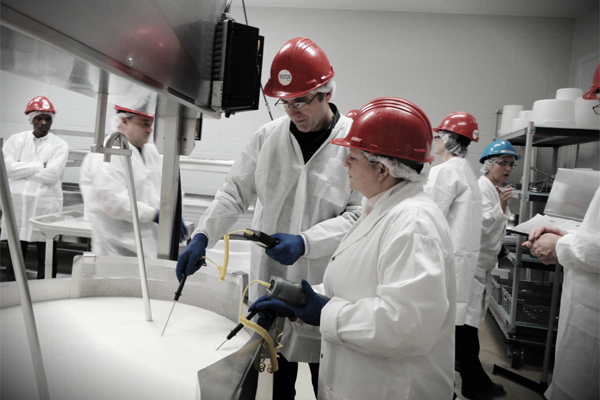



|
Tweet
Pin
It
|
Traditionally dairy technology was a part of veterinary and animal husbandry courses. These courses were and still is offered by Agricultural Universities as a part of the B.VSc, (Bachelor of Veterinary Science and Animal Husbandry). Now there are several institutes offering exclusive diploma, undergraduate and postgraduate courses in Dairy technology. Many general universities also offer dairy science as vocational subject at the BSc level. Dairying is also available as a vocational subject for the 10+2 level education.
A dairy technology course comprises of three basic areas like Dairy Engineering which deals with only the technological aspects of the product; Dairy Chemistry which comprises the products, such as the percentage ratio of milk and cream contained in a specific dairy products and Dairy Bacteriology which maintain products standards and the role of a biotechnologist is very important.
Specialisation in the specific or related area like Veterinary Science, Dairy Technology or Engineering is a prerequisite for entry into this field.
Course Areas :
Courses in dairy technology are available at the diploma, graduation, postgraduate and doctoral levels. The diploma and degree courses in dairy technology require candidates who have passed the 10 + 2 examination, with Chemistry, Physics, Mathematics and English or Physics, chemistry, Biology or Agriculture with a minimum aggregate of 50 % marks.
The diploma courses of two years duration include Indian Dairy Diploma (IDD) and National Dairy Diploma (NDD). This is a base course for BSc / B.Tech dairy degree and gives basic knowledge on breeding, feeding of animals, their health care, farm management, planning a farm, milk products, dairy chemistry, bacteriology, book keeping etc. At the graduation level, the course is usually called B.Tech./B.Sc. in Dairy technology or Dairy Science. After graduating in dairying, candidates can opt for further studies and specialisation through a Master's programme in Dairying (M.Tech in Dairy Technology/ MSc Dairy Science), or related areas such as animal genetics and breeding, livestock production, Animal biochemistry, Animal bio-technology or in fields of food technology and preservation.
Duration : Dairy Diploma course is of two years duration for lower level technical positions. The B.Tech / B.Sc in Dairy Technology is a four years course after 10+2. The B.VSc, (Bachelor of Veterinary Science and Animal Husbandry) is also a four years programme. The Master's programme in Dairying (M.Tech in Dairy Technology/ MSc Dairy Science) is of two years duration.
Selection :
In most of the States, selection to the graduate course in Dairy colleges is on the basis of an All India Entrance Examination in Physics, Chemistry and Maths of plus 2 level, common to other agricultural and animal science courses OR on the basis of the entrance examination conducted by the concerned universities. Veterinary Council of India conducts an 'All India Common Entrance examination' (AICEE) for admission to first year Bachelor of Veterinary Science (BVSc) & Animal Husbandry (AH) degree course for filling up 15% of the total number of seats of each veterinary college of all states; about 36 colleges where Indian Veterinary council Act, 1984 extends. This Entrance exam is usually held in the month of May each year. For admission to masters degree programme, an All India Entrance Examination is conducted by the Indian Council for Agricultural Research (ICAR).
Personal Skills :
Persons aspiring to make a career in dairy technology should have scientific temper, willingness to work hard, commitment, an enquiring mind and cleanliness. They must be prepared to live in remote areas, or far away from the comforts and conveniences of the city.
Find it Useful ? Help Others by Sharing Online
Comments and Discussions |
Related
Career Options
|
|||
|
|